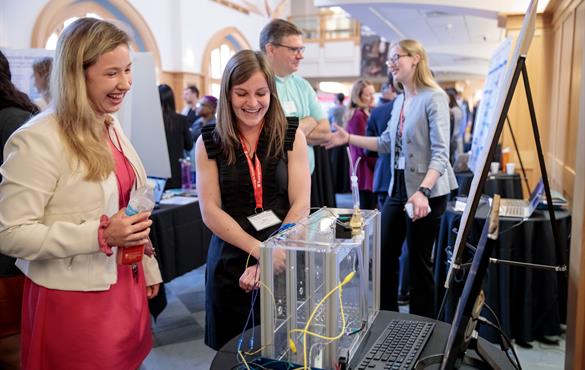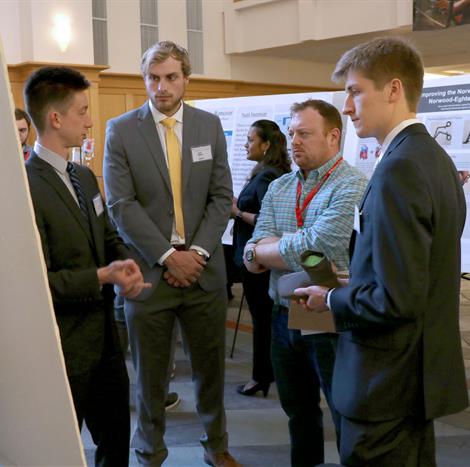Student innovations take center stage at 2019 BME Day
More than 20 student-developed projects were presented at the department’s annual event celebrating research and innovation within the field

The Department of Biomedical Engineering at the McKelvey School of Engineering celebrated its annual BME day on April 29 with awards, a keynote lecture from a leader in the field and the annual pitch presentations and senior design competitions that show off the innovative spirit of the department’s students.
"The BME student pitch presentations and design competitions are examples of what we hope to encourage of all McKelvey engineers," said Lori Setton, chair of the department. "Highlighting the best of student and faculty research aligns perfectly with our role as the hub for all things biomedical engineering and bioengineering in McKelvey."
More than 20 student teams took part in the event's senior design poster presentation, which featured products created by students enrolled in the capstone course.
"The senior design competition at BME Day represents a culmination of four years of study for our students," said Joe Klaesner, professor of physical therapy and of radiology and adjunct associate professor of biomedical engineering. "It offers them a way to showcase how hard work in the classroom can be used to solve real-world biomedical problems."
One such solution is VoltaFeet, a wearable pair of smart socks that uses antimicrobial silver ions to eliminate foot odor and protect against diabetic foot ulcers. Created by Ashton Naumann, Matt Heiken and Logan Groneck, the product won first prize at the event's Senior Design Awards and has already attracted some potential investors.
"It was a tremendous honor to be recognized by the judges and department," Naumann said. "Our project would never have flourished without the guidance from our collaborators along the way." He credits faculty and staff from biomedical engineering as well as from the Sam Fox School for their guidance and collaboration on the project.

"We're going to see how far VoltaFeet can go," Groneck said. "We'll spend time looking into the strength of the intellectual property and its potential for development, as well as having follow-up conversations with people who are interested in the project and see if we can get something to take off."
The event's second-place winners were Raphael Chung and Kevin Park, who developed TransUrethral Anterior Dilation of Prostate, an implant and delivery device for the treatment of benign prostate gland enlargement. Third-place winners were Taylor Lavender, Jack Elliott-Higgins and Katie Simons, creators of NerveStim, a cuff that produces high-frequency nerve blocks on peripheral nerves providing pain management therapy for patients with chronic post-operative pain.
"My favorite part of BME day was seeing and hearing about all of the awesome projects that my fellow classmates and I had put so much time and effort into over the past year," Heiken said. "As a BME student, you become close to large number of your fellow classmates, and BME Day was a great way to conclude our four-year quest together and celebrate everyone's success."
Rounding out the day's events were the New Faculty Presentation, delivered by Associate Professor Princess Imoukhuede, and presentations delivered by the department's doctoral students. Graduate students enrolled in the master's of engineering in biomedical innovation program, such as Cassie Davis — who recently won first place at a local entrepreneurship competition sponsored by Saint Louis University — also pitched their products.
The day concluded with a keynote presentation by Kwabena Boahen, the Frank and Grace Yin Distinguished Lecturer. Boahen, a professor of bioengineering and electrical engineering at Stanford University, presented his research that uses silicon integrated circuits to emulate the way neurons compute, linking electrical engineering and computer science with neurobiology and medicine.
"We were fortunate to have Kwabena Boahen, a true innovator in building networks that model the brain," Setton said. "We saw WashU faculty and students from across electrical engineering, computer science, neuroscience and BME come together with great interest in learning how systems are constructed to efficiently manage the complexity of brain networks."



